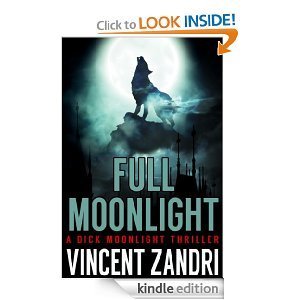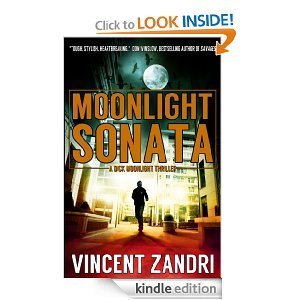Benjamin Sobieck's Blog, page 25
January 12, 2014
Review: Detective-Werewolf Meets Werewolf-Detective
Detectives turning into werewolves. Werewolves moonlighting as detectives. What's happening to our crime fiction PIs?
What's happening is a mash-up between two big characters in my universe of crime fiction: Vincent Zandri's Dick Moonlight (read my review of the latest Moonlight novel here) and Paul D. Brazill's Roman Dalton (read my review of Drunk of the Moon 2 here). They meet up in Full Moonlight, a short story of paranormal mystery set at a cemetery.
On dead, cold, dark winter nights like these, it made for a fun read. Nothing to be taken too seriously, but then again we're talking about werewolves here. The caper involves mutilated bodies, corpses coming back to life, prophetic dreams and plenty of zany Zandri zingers. There's also a scene involving a dog walker and a horny werewolf, if that's any indication of the mood.
You can get Full Moonlight from Amazon for the Kindle or from any of the major e-book retailers for less than a couple bucks. Check it out.
January 6, 2014
Pop Quiz: Do All Revolvers Hold Six Rounds?

The term "six shooter" is often used as shorthand for a revolver. But do all revolvers carry six rounds?
Nope. They can carry as five, six, seven and more. This Taurus Model 608 even packs eight .357 shells.
Don't feel limited when writing revolvers. If you need an extra shot or two for a scene, there are revolvers out there with more than six.
For more tips like this one, be sure to sign up for my free e-newsletter. You'll get an e-book on the house. Don't forget to check out my
Writer's Digest
guide to firearms and knives in thrillers and crime fiction when it hits late 2014.
December 31, 2013
Review: Moonlight Sonata by Vincent Zandri
The Zandri machine has become self-aware.
Crime novelist Vincent Zandri has always tread a fine line between reality and fiction. The Concrete Pearl, for example, was based on his own understanding of a construction scheme gone wrong. The Shroud Key borrowed heavily from his travels in Egypt. And his novels frequently take place in Albany, where he lives.
He's also shown few differences in his protagonists. Dick Moonlight, Jack Marconi and Chase Baker could all be the same person.
What this suggests to a prolific Zandri reader like myself is that the author is projecting himself into the stories. Not in the way a normal author sprinkles metaphoric fragments of his or her personality into stories. No, it suggests Zandri is writing about himself and his life in an almost literal way without crossing the bridge into biography.
But is the author at all aware of this as readers like myself? Zandri's latest release, Moonlight Sonata, answers that with a big "yes."
The Best in the Series
Private detective Dick Moonlight is hired by a literary agent to track down a best-selling poet/novelist. It makes for perfect writer porn, the kind I can't help but eat up, which may be why I thought this was the best read in the Moonlight series.
Zandri's prose flows effortlessly as usual, making it a fast but satisfying read. Many crime novels that attempt this speed lose something in the process, but it's a testament to Zandri's talent that Moonlight Sonata never feels empty.
Sure, there are a few shortcuts to establishing characters, and it's doubtful the Moonlight series will ever win a Pulitzer, but that's not the point. This is well-written, entertaining genre fiction. It feels simple, but that's why it's so hard to pull off as a writer. The best athletes make it look easy. It's the same way with writing. Moonlight Sonata demonstrates this in spades.
When a Character Becomes the Author
Maybe that's because Zandri hit a catharsis. He stopped pretending there was any difference between himself and his Moonlight character. In Moonlight Sonata, the private detective writes and (eventually) publishes a novel based on his life. Its title? Moonlight Falls, the first novel in the series.
That re-frames the entire Moonlight series, since the novels are written in first person. Now the novels are actually memoirs written by Dick Moonlight, not Vincent Zandri.
And because the two are the same, Zandri is free to spout off - safely, from within the confines of fiction - his feelings about the publishing industry without suffering any consequences.
Check out these excerpts from a conversation between Moonlight (Zandri) and Professor Oatczuk (possibly representing Zandri's critics or people questioning the rise of e-books):
"When I think of private detectives, the ones made famous in genre fiction and the pulp magazines of yesteryear, I can't help but think of guns, illicit sex and sleaze galore," [Oatczuk said]. "Mediocre fiction for the masses."
and
"That's just it, Moonlight," [Oatczuk] said. "It's people like you…mere pedestrians…who pen a first novel and, entirely ignorant of the process, end up writing some piece of subpar material that shoots to the top spot on the Amazon Kindle Bestseller list or some such shit."
Moonlight takes Oatczuk to task for these comments, and it may as well be Zandri telling stuffy hand-wringing literary professors to pipe down. Because the Moonlight series is all about guns, illicit sex and sleaze galore. One of the last scenes of Moonlight Sonata proves it beyond any doubt.
The Bottom Line
Moonlight Sonata is the best of the series, both for the story and the shift in its approach. The author and the character are evolving. My recommendation is to jump right in, skipping the earlier reads. Not that they were bad, it's just that this one is the star of the bunch.
Click here to get Moonlight Sonata for Amazon Kindle or paperback.
P.S. If you thought this review was nifty, please sign up for my free e-newsletter.
.9mm or 9mm? .30-06 or 30.06?

I was reading an otherwise excellent crime novel (it will remain anonymous) that used ".9mm" to describe a handgun. It also called a rifle a "30.06." Both stopped my eye as a reader and took me out of the story because both are incorrect.
The right way is "9mm" and ".30-06."
It can be confusing, so here are three rules of thumb when writing any firearm.
1) If there's a "mm" after it, there's no "." before it. Common examples would be 7mm (a rifle) and the 9mm (a handgun). The rule applies even with convoluted calibers like the 7.62x39mm.
2) For handguns and rifles when there isn't a "mm" (that stands for "millimeter," by the way), there's always a "." before it. So it's .22, .223, .270 and the like. If the number is busted up, it's divided by a "-" and not a "." as in .30-06.
3) Shotguns are a little different since they're sorted by gauges. They're written like "12 gauge" or "12-gauge" and "20 gauge" or "20-gauge." Just be consistent. The .410 is different since it's the runt of the litter, and is actually identified as a caliber.
Make sense? Yes? No? Leave me questions in the comments.
If this article helped you out, be sure to sign up for my free e-newsletter. I'll send you more handy tips like this one. You'll get a free e-book on the house when you subscribe. And be sure to check out my Writer's Digest guide to firearms and knives in crime fiction and thrillers when it hits in late 2014.
December 27, 2013
Best Crime Novel of 2013 and Other Dubious Awards
For what it's worth, here's my rundown of the best of 2013. The only qualification was that I had to have experienced it in 2013. Nominees had to be related to the crime fiction genre somehow. Yeah, that's pretty loose. No arguing about the rules, kids, that's just how it's going to go.
Best Crime Novel of 2013
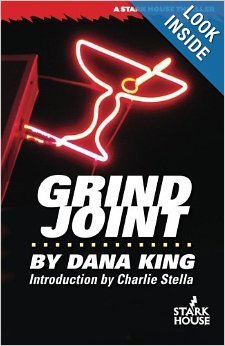 Grind Joint by Dana King can add another notch to its best-of list belt. After a pair of too-good-for-this-small-pond novels, Wild Bill and Worst Enemies, King inked a deal with publisher Stark House Press. His "debut" (it's being called that, but it's only sorta one) with SNP showed what can happen when the writer and publisher are on the same page, so to speak.
Grind Joint by Dana King can add another notch to its best-of list belt. After a pair of too-good-for-this-small-pond novels, Wild Bill and Worst Enemies, King inked a deal with publisher Stark House Press. His "debut" (it's being called that, but it's only sorta one) with SNP showed what can happen when the writer and publisher are on the same page, so to speak.
Everything about the first two novels - from the cop talk to the financial politics of crime - is put into hyper-focus with Grind Joint. The novel opens with a dead body at a casino with a bad rep, then takes the reader along for a little jaunt with some of the worst people on Earth.
I shit you not, I received a random request through this website from someone looking for "a 2013 crime novel I can recommend to someone else" and look hep (tip: be sure to actually read the book before trying that pick-up line at book clubs). I told that person to pick up Grind Joint.
And now I'll tell it to you, dear reader. Grind Joint is my top pick for 2013 crime novels.
Best Literary Novel
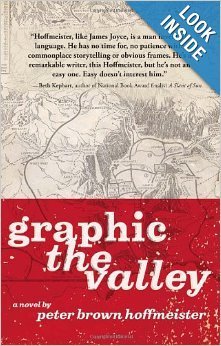 Graphic the Valley by Peter Brown Hoffmeister is a perfect example of the shift into the literary hemisphere at the usually crime-y Tyrus Books.
Graphic the Valley by Peter Brown Hoffmeister is a perfect example of the shift into the literary hemisphere at the usually crime-y Tyrus Books.
Graphic the Valley is about Tenaya, an American Indian living off-the-grid in Yosemite Valley. He slips in and out of the modern world as the story slips in and out of time. Hoffmeister parallels a battle between Tenaya's tribe and the U.S. Army 150 years ago with the protagonist's own struggles to retain identity - both of himself and his ancestral Yosemite Valley.
Hoffmeister's style is hard to categorize. He messes with sentence structure (just check out the title for an example) as much as he does the timeline. But it all makes sense. There's a universal logic to the unusual storytelling that readers innately knew all along, but needed Hoffmeister to reveal to appreciate. That reverberates all the way down into the plot.
Graphic the Valley is billed as a "modern retelling of Samson and Delilah," but something tells me that was slapped on after the marketing department threw its hands in the air and said, "I don't know what this is, but holy shit is it good."
Best Potboiler Read
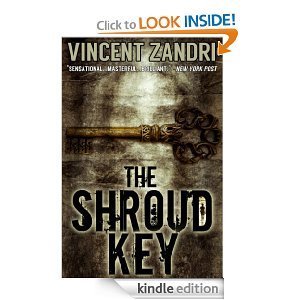 One of my favorite crime novelists, Vincent Zandri, took on the Dan Browns of the world with The Shroud Key this year. Predictably, things went well for the Egypt-based potboiler read.
One of my favorite crime novelists, Vincent Zandri, took on the Dan Browns of the world with The Shroud Key this year. Predictably, things went well for the Egypt-based potboiler read.
Sure, The Shroud Key has all the trappings of one of Brown's novels: an ancient secret, a history-changing relic in the hands of bad guys, a globe-trotting hero wearing a hat and a bunch of Old Testament wrath wrangling.
But you know what? If you put Vince and Brown in a dark Cairo back alley, I'd put money on Vince. He went to Cairo in the middle of the Arab Spring (against the explicit wishes of the U.S. State Department), gathered materials for the book while Tahrir Square rioted, rode a camel and still had time to contribute feature pieces to Living Ready, the survival magazine/book brand I had a hand in starting.
Shiste, and that's the non-fiction provenance to a fictional book. Pepper in Vince's signature style, and The Shroud Key is page-turning fun for popcorn munchers.
Best Crime Movie

Mud didn't track in much dirt at the box office, but that doesn't mean it's not worth a rental or stream.
(Yeah, yeah, yeah, this came out in 2012. See the rules in the first paragraph.)
Matthew McConaughey plays a guy named, you guessed it, Mud. He lives in a boat in a tree on an island, where he waits for his girlfriend to arrive. A couple kids make friends with Mud, then find out the real reason he's on the island.
This is up there with Winter's Bone as quintessential Southern noir viewing. Watch it.
Best Crime TV Show
Justified. Duh.
Best Online Crime 'Zine
Out of the Gutter wins it for me. Expect pulpy stories about degenerates and their bloody hijinks. Hey, it even published my little ditty, Bloodboarding.
Engaging editors, snappy writing and a fresh look kept Out of the Gutter top notch. Things shouldn't be any different in 2014.
Best Reuben Sandwich
Sandwiches are important. That's why it was a big deal to finally find the perfect reuben. It's at Rockwoods in Otsego, Minnesota.
Does this factor into crime fiction at all? Not really. But so what? It's a great sandwich.
December 26, 2013
Quick Read: Christmas Flash Fiction at Black Heart Magazine
Has this Christmas made you want to punch the nearest thing wearing red? Does the sight of Christmas lights make you want to hang an elf? Is murder somehow your most rational option right now?
Please don't do those things. Maul Santa Claus vicariously - and legally - in my short piece of Christmas fiction over at Black Heart magazine. This literary stocking is stuffed with the present you were too afraid to ask for this year: putting the hurt on Santa Claus. Ho, ho, hope you have health insurance, you diabetic loaf.
Click here to read this Christmas flash fiction miracle.
December 23, 2013
How to Leave Milk and Cookies for Santa Claus in 10 Steps
[image error]a guest post by Maynard Soloman, gal-damn detective
When Santa Claus breaks into your home Christmas Eve, tramples through your living room and leaves a pile of shit to throw out in February, you'll be glad you read this guide.
Why? This greedy bastard expects some sort of tribute. Virgins, probably. But since you lack the upper body strength to hurl said virgin into that volcano, you'll do something else. You'll leave milk and cookies.
You're a sap.
Here's how to do it the right way:
Load your shotgun.Stick the business end up the chimney.When you hear noise, shoot.As the remains of Santa beg for mercy at your feet, fetch the milk and cookies.Taunt Santa while eating the milk and cookies.Go on the roof and slaughter the reindeer. Tell Santa you know a nice meat processor.Come out of your drug-induced haze, you stupid doper. There is no Santa and there are no reindeer. Also, the cops are here.Use your one phone call from jail to tell your family you dropped acid on Christmas Eve. They will use words like, "extremely disappointed," "we're changing the locks" and - since you pissed away most of your life - "not surprised."As you sit in jail, you will get a nickname from the other inmates. It will be "Milk and Cookies." You will not enjoy this name. Especially when the big fat guy with a beard comes over to "get my Milk and Cookies."Let me know if you need some bail money. I'd be happy to laugh in your face.
Want to read more? Check out Maynard Soloman Proves Santa Claus is real, available for 99 cents for the Kindle, Nook and all other major e-readers.
December 20, 2013
Celebrity Scandals: Why Free Speech is a Bad Argument
 People in these United States of America take freedom of speech seriously, and rightfully so. As a journalist, writer and someone with a career in the publishing industry, it's even more than a principle or words on paper. It's a part of my identity. I live it every day.
People in these United States of America take freedom of speech seriously, and rightfully so. As a journalist, writer and someone with a career in the publishing industry, it's even more than a principle or words on paper. It's a part of my identity. I live it every day.
Which is why I wish people would stop invoking free speech for issues that have nothing to do with it, especially when the situation involves celebrities. It waters the principle down for legitimate speech issues.
When Celebrities Try to Be Constitutional Scholars, They Fail
The situation usually goes like this:
1) Celebrity A says something controversial.
2) Company B fires Celebrity A.
3) Supporters of Celebrity A claim (loudly) his/her freedom of speech was violated.
Just pick your juicy celebrity scandal and it works the same way. Doesn't matter which celebrity or the opinions expressed.
What matters is that in each case, invoking the freedom of speech is a bad argument. Here's why.
What Freedom of Speech Is: Government-to-Citizen Interactions
As outlined in the First Amendment, the freedom of speech is a blanket term for the hands-off approach government takes (or is supposed to take) for expressions by private individuals. It only addresses government-to-citizen interactions. Just take a look:
Congress shall make no law respecting an establishment of religion, or prohibiting the free exercise thereof; or abridging the freedom of speech, or of the press; or the right of the people peaceably to assemble, and to petition the Government for a redress of grievances.
(Fun Fact: A strict reading suggests that the First Amendment only applies to Congress, not the other two federal branches of government. Thankfully, it's not interpreted that way.)
What Freedom of Speech Isn't: Citizen-to-Citizen Interactions
What's missing in the First Amendment is any word on citizen-to-citizen expressions. That also goes for associations of citizens, such as businesses or other organizations.
That means citizens are free to regulate their own speech. They make their own rules.
Because of this, citizens often enter into their own speech agreements. Their only inalienable right regarding those agreements is for the government to keep its nose out of it.
When a citizen-to-citizen dispute involving speech comes up, it's the citizens that get to resolve it. Government is supposed to stay out of it. That's freedom of speech.
So when a citizen tells one citizen to quiet down, an appeal to freedom of speech doesn't work. That's a citizen-to-citizen interaction, not a government-to-citizen one.
In the case of the fired celebrity, it's more of a contract issue, not a speech issue. In a way, that private contract trumps the Bill of Rights.
A Better Argument: Just Disagree
The better argument is to simply disagree, not invoke rights. If enough people disagree with a decision, it may convince the one making it to do something else. If that does happen, it's not a concession based on rights. It's based on popular opinion.
But Isn't Freedom of Speech Important? Shouldn't Everyone be Allowed to Express Themselves?
Yes, it's crucial. But a citizen isn't violating another's speech when censoring another citizen. That only happens when government is the one with the muzzle.
So What? People Have Rights Just by Being Human Beings
No one has more or less of an inherent right to speech. But that changes when contracts and property are involved. Contracts can spell out which party regulates appropriate speech. Those with property rights can also determine speech within their domain. Anyone in disagreement is free to voice an opinion and accept the consequences, or exit the contract or property.
Pop Quiz
Now put it all together.
* A private company firing an employee or contractor for expressing something contrary to policy? Not a speech issue.
* A government entity demanding to see newspaper stories before they are printed? Definitely a speech issue.
* Amazon Kindle refusing to sell my latest Maynard Soloman, gal-damn detective, collection? Not a speech issue.
* Facebook deleting your dipstick rant about Meryl Streep moon landing conspiracy theories? Not a speech issue.
* Public universities setting up "free speech zones" where students are confined to demonstrate during political events? A speech issue, and a post for another day.
* The federal government locking up a journalist for refusing to reveal sources? Holy ham hocks, that's a huge speech issue.
* Me deleting a comment on this post for no other reason than I feel like being a jerk to someone today? Not a speech issue, although I may want to check my ego.
Who Cares?
Knowing the difference matters because outrage, especially in the era of social media, is often misdirected. If you're going to get worked up about something, fine, but at least understand your argument.
Of course, you're free to disagree with me. Leave a comment below. I'll be happy to exercise the other side of the free speech coin: Not giving a damn what you think.
Writing Guns: Will a Conveniently Placed Item Stop a Bullet?
This was originally a guest blog post over at crime author/criminologist Jennifer Chase's website. I added a couple items I thought were important here.
In a classic episode of The Simpsons, Ned Flanders takes two bullets to the chest. The pious neighbor walks away unscathed, all thanks to a Bible and a piece of wood from the ol' rugged cross under his shirt.
Although the show is meant to be satirical, it's a scene played out with a straight face in the rest of fiction, most notably the crime genre. A character is seemingly shot to death, only to stand back up thanks to a convenient object beneath the clothing that "stopped the bullet."
So how close is this to reality? Is it possible for this to happen?
The Short Answer
Yes, but the odds are pretty low. Here's why.
A bullet in motion, like any other projectile, transfers its kinetic energy into whatever it hits. That energy is what causes the bullet to penetrate a target, in this case a character. There are two ways to prevent this from happening: absorption and deflection.
Possibility #1: Absorption, aka "Stopping the Bullet"
In order for the bullet to stop, the energy needs to go somewhere other than into the character. The best bet is a material that can absorb that energy without causing injury to the character. It must be strong, yet flexible enough not to break.
That's why bullet-proof gear is made from threads of durable, synthetic fibers woven together. Energy leaves the bullet and becomes trapped in the web of the fibers, sort of like a soccer ball getting caught in the netting of a goal. Other variations are made from tough plates that act like high-tech armor, but still apply the same principle of absorbing the energy.
Any conveniently placed item - a book, a flask or even Ned's piece of cross - needs to be able to do same. A malleable piece of metal would work better than wood, since that will splinter into pieces. However, metal can also indent and cause injury anyway.
What about a book? Or even the good book itself, the Bible? Books are decent at absorbing energy. However, larger calibers are going to punch through books - as well as other small items - without a problem.
Possibility #2: Deflection, The More Likely Option
That's why deflection is more likely than "stopping the bullet." Anything hard will do, although metal wins top honors. Don't forget human bone, too. It's actually a good candidate for deflection, especially the skull. Just remember that bullets don't magically disappear. A deflected shot has to terminate somewhere.
Be it absorption or deflection, the conveniently placed item isn't the only factor at play. Distance, caliber, bullet type, trajectory and more can all influence what happens. I made some generalizations here so writers don't get all Tom Clancy on readers. Leave me a comment if you have a specific scene in mind.
Bottom Line: Luck Isn't On Your Side
No matter what, the character with the conveniently placed item would be extremely lucky - and left with a bastard of a bruise. The item would also need to be lucky, since it would need to absorb or deflect the bullet's kinetic energy without shattering or puncturing the character's body.
That doesn't mean it's not possible. It's just not probable. What a writer does with this slim percentage isn't up to me. I'm just here to explain what's going on here. Take my word for it. This isn't one you want to try at home.
If you're interested in learning more about firearms and knives in fiction, be sure to check out my Writer's Digest guide. It hits shelves in print and as an e-book in late 2014. Until then, be sure to sign up for my free e-newsletter with firearm and knife writing tips.
P.S. Cheers to writer bud Laura Roberts of ButtonTapper.com and BlackHeartMagazine.com for inspiring the topic of this post.
December 19, 2013
Fact or Fiction: Item Under Clothing "Stops the Bullet"
Jennifer Chase has long been a crime author I've admired. She approaches the genre from the lens of criminology. Check out this helluva bio from her website:
Jennifer Chase holds a bachelor degree in police forensics and a master’s in criminology. In addition, she holds certifications in serial crime and criminal profiling. She’s a member of the International Association of Forensic Criminologists.
So when she asked if I'd do another guest blog post (I'd done one on myths about silencers in crime fiction), I immediately said "yes." This time it's addressing the convenient item placed under clothing that magically "stops the bullet" pervasive to thrillers and crime fiction.
If you're curious to know whether this is possible in reality, check out the post about "stopping the bullet" here. It'll also appear on this website soon.

